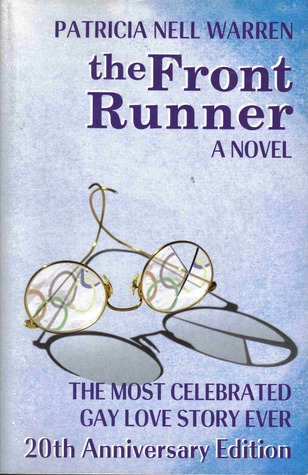The death this week of author and activist Patricia Nell Warren was a huge loss to the LGBTQ books community. For many, it felt like a personal loss, because of how deeply her writing, in particular her novel The Front Runner, touched readers.
The Front Runner was released in 1974, after Stonewall, but long before sodomy was widely legalized. Although there were other great books about gay men and gay love out already, most reached a limited audience. The Front Runner became the first book about a gay romantic relationship to reach the New York Times bestseller list, and to reach an audience which had not seen that storyline play out in fiction before.
That audience included many gay men, for whom a book that treated gay love seriously, respectfully, romantically, and realistically, was sometimes a revelation. Read the obituaries posted for Warren, and you will see man after man saying that The Front Runner gave them hope like no book they had read before. In those pre-internet, pre-visible-role-models days, many gay men had never been told that their feelings and desires were normal and deserved respect. One man commented on her obituary that after reading the book, he dumped his hoarded Valium tablets into the toilet and resolved to live. Because now he knew there were other men out there who felt as he did, and he realized he was not alone. Powerful words.
The Front Runner was also not a sanitized, change-the-pronouns book, presenting a gay relationship as just like a het one. Harlan, a college running coach, is shown through flashbacks to have had a loveless straight marriage, to have pursued sex on the down-low in the gay subculture of New York City, and to even have been a high-priced hustler. That’s not the biography of a heterosexual male romance novel lead. And she made readers believe that background did not mean he was any less worthy of love, or any less able to love.
What Harlan is attracted to in Billy, one of his runners, is also tied to his maleness—not feminine pouty lips and dewy eyes and round ass, but the lean, pared down, stringy, male body of a long-distance athlete. The book brings the reader into a love between two men that feels real and vital and important. The guys go through a beautiful wedding ceremony that is not, in that era, a legal marriage. That open ceremony creates more risk than safety for them, but helps show readers the degree to which their love deserves, and is denied, equal respect and equal dignity.
The book changed hearts and minds. On those same obituaries, you can read a comment from a woman who said it made her reach out to her estranged gay brother and led to a close lifelong relationship. Another who said she stood up for her cousin who was kicked out of his house, and took him in with her. And so many isolated gay and bi men who saw, in Patricia Nell Warren’s words, a reflection of themselves far kinder and more respectful than anything they’d been exposed to before, a mirror in which the future they wanted could be believed in, shared, and might be attainable.
Sadly, perhaps inevitably, the book ends in tragedy. Billy is an out gay man reaching for the pinnacle of a sport dominated by straight man, and he’s risking everything. The gut punch of that unfairness, of that devastating impact of hate, made activists of many readers and writers of some of us (including myself.) How sad that almost fifty years later, we still have no active out gay players in several major league sports in the US. But the day is almost certainly approaching, and The Front Runner has played a part in the journey.
We can argue about whether the book itself, which sold 10 million copies over 45 years, has aged well. (I personally still love it, but it’s definitely a product of the 70s.) That’s not relevant to the deep, lasting impact it had, or to the demonstration of how fiction can work for change. Patricia Nell Warren wrote several other books, and as an out lesbian was also an activist for LGBTQ rights all her life. It’s a tribute to her talent, and the power of fiction, that she undoubtedly had the biggest impact with the fictional story of two men whose hearts and bodies were made for each other.
RIP and thank you, Patricia Nell Warren – June 15, 1936 – February 9, 2019
-Kaje Harper
02/2019


Lovely tribute! I came to The Front Runner much later in life but it was just as impactful. Wish I had read it sooner.
Thank you. It seems like her book continued to have an impact for decades. It definitely started me on my journey to become both an ally and an M/M writer.